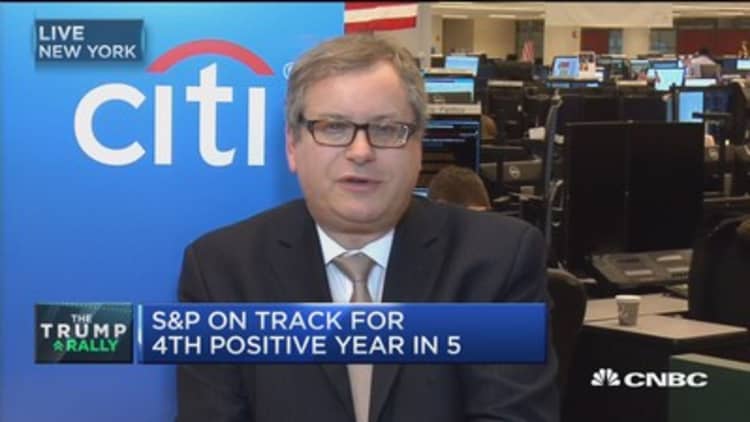
U.S. stocks closed lower on Thursday in light year-end trading as traders began to look ahead to 2017.
The U.S. announced sanctions against Russian individuals and organizations it believes interfered with the 2016 U.S. election. However, traders said it was likely not affecting stocks.
Art Cashin, director of floor operations at UBS, suggested the U.S. needed a tougher stance to signal a lasting geopolitical change.
"All we know is they expelled 35 diplomats … You've got to see more sanctions, you've to see trade restrictions," Cashin said. "Otherwise it's not going to affect the market and everyone assumes when Trump comes in — in 23 days — he may make things calmer."
The White House sanctioned nine entities and individuals, including two Russian intelligence agencies and four officers of its main intelligence agency. It also expelled 35 Russian diplomats and closed two separate compounds.
The Dow Jones industrial average first went negative during late-morning trade, led by JPMorgan Chase and Goldman Sachs, which finished at the bottom of the index along with DuPont. The Dow is down 0.57 percent this week and is on pace for its first negative week since before the election. It continues to be up 13.74 percent year to date.
Meanwhile, the ended the day down 0.03 percent, with the Financial Select Sector SPDR Fund as the biggest laggard, down nearly three quarters of a percent. The index is up 10.05 percent year to date.
The NASDAQ Composite ended the day down 0.12 percent after closing 0.89 percent lower on Wednesday.
Other investors can't seem to agree on whether the market has checked out for the year or is just taking a breather before sprinting to the finish.
"It's been a tumultuous year, both politically and in the markets with ups and downs, and people have decided to check out early," Chris Rupkey, chief financial economist at MUFG Union Bank, said.
After the Dow drifted away from the 20,000 mark on Wednesday, Rupkey said it's important to see where the Dow closes in relation to the milestone, but he's not expecting a lot of volatility during these next two days.
"The market's more or less shut down for the year ... the final statement on the year will be tomorrow's close," Rupkey said. "It's important to see 10-year Treasurys and how high the Dow closes to 20,000."
Michael Farr, CNBC contributor and president of Farr, Miller & Washington, on the other hand, believes the Dow will hit 20,000 on Friday.
"[Wednesday's] loss was something of a pause in the markets," he said. "It's a kind of collective rebuilding of a short-term base, and I think it can provide support for the final year-end surge."
Major U.S. Indexes
On the data front, jobless claims declined by 10,000 to 265,000, according to Thursday morning's Labor Department report. This marks the 95th straight week that claims were below 300,000, a threshold associated with a healthy labor market. Jobless claims were expected to drop to 264,000 for the week ending Dec. 24, according to economists polled by Reuters.
Meanwhile, the country's trade deficit in goods grew last month, according to a report released by the Commerce Department on Thursday. The initial estimate, which does not include trade in services, showed that the country exported $1.2 billion less in November than in October. Imports rose by $2.2 billion during the month.
The Dollar has surged about 5 percent since the election, which could be one reason for the wider trade deficit.
"The Dollar's been strengthening in a new way that we haven't seen for several months on the Trump rally, and there seems to be some evidence that the strength may be pricing U.S. goods out of world markets," Rupkey said.
The U.S. dollar index was trading lower against the euro and slipped to a two-week low against the yen on Thursday.
Meanwhile in oil, WTI settled down at $53.77, while Brent was down 8 cents, at $56.14 a barrel.
The Treasury Department auctioned $28 billion in 7-year notes at a high yield of 2.284 percent in the last auction of the year.
After the auction, the yield on the benchmark 10-year Treasury note fell below session lows to 2.462 percent, its lowest level in more than two weeks. The 10-year note yield eventually rose to 2.474.
On tap this week:
Friday
9:45 a.m. Chicago PMI
*Planner subject to change.
—Reuters, CNBC's Patti Domm, Jacob Pramuk and Alexandra Gibbs contributed to this report.


